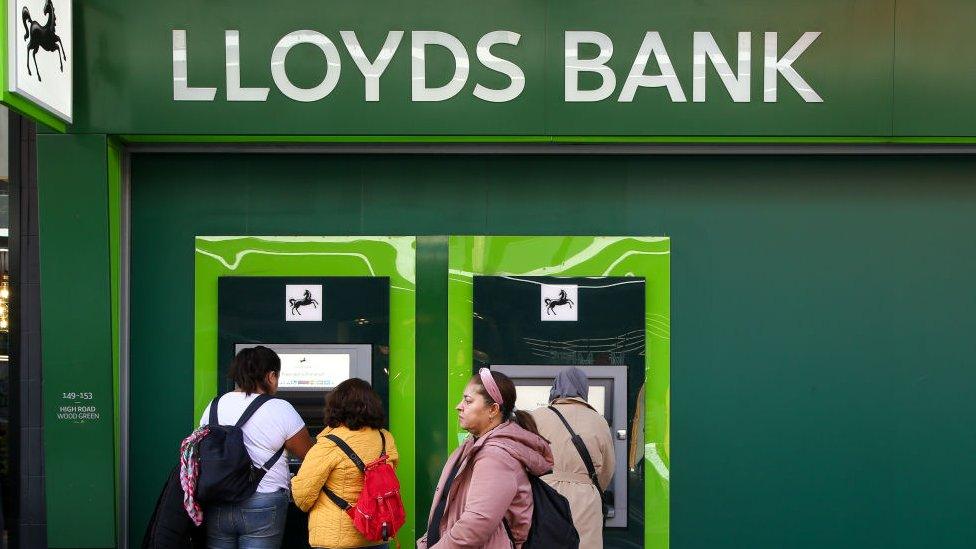Lloyds sets aside £450m for car finance probe
- Published

Banking giant Lloyds has set aside £450m to cover the potential cost of an investigation into car finance deals by the UK's financial regulator.
A probe into whether people had been paying too much for cars was launched by the Financial Conduct Authority (FCA) last month.
Brokers who arranged car financing earned commission on the interest rates that they set for customers.
Lloyds revealed the provision as it announced a big rise in annual profits.
The bank said pre-tax profits jumped to £7.5bn last year, which was higher than expected and up 57% from the year before.
The FCA announced last month that it would investigate whether people who believe they were charged too much for car loans were owed compensation.
Meanwhile, the Financial Ombudsman says it has received 17,000 complaints to date about motor finance commission.
Lloyds is seen as the most exposed of the major banks to any claims, as it owns one of the UK's largest motor finance providers, Black Horse.
Under what were called discretionary commission arrangements, some lenders had allowed car dealers to adjust interest rates on loans, which would improve the commission they received. In short, the higher the interest rate, the higher the commission.
As a result, these deals created an incentive for brokers to increase how much people were charged for their car loan.
In 2021, the FCA banned these arrangements, saying it would collectively save drivers £165m a year.
Last month, the regulator said that about 10,000 people had made complaints to an ombudsman, with "many more waiting in the wings".
"If we find widespread misconduct, we will act to make sure people are compensated in an orderly, consistent and efficient way," the FCA said at the time.
The amount that Lloyds eventually pays to cover compensation could be higher or lower than the initial amount it has set aside.
The potential cost of compensation has raised comparisons to the amount paid out during the payment protection insurance (PPI) mis-selling scandal, which cost banks tens of billions of pounds.
But Lloyds' chief financial officer, William Chalmers, told reporters that the car finance probe was "not like prior remediations".
Speaking to the BBC's Today programme, Lloyds chief executive Charlie Nunn said: "The extent of any misconduct or loss on behalf of customers, if any, remains very unclear so we welcome the FCA's announcement a few weeks ago to look into this to provide clarity for customers and the industry."
Matt Britzman, equity analyst at Hargreaves Lansdown, said the £450m set aside by the bank was "less than some had feared but there will be question marks around how Lloyds has come to that figure".
"Lloyds has been honest in saying the outcome of the review is largely unknown," he added. "What we do know is that Lloyds is one of the more exposed banks should the FCA deem there was misconduct and customer loss."
Lloyds also said in its annual report that it was the subject of another investigation by the financial watchdog, looking at the group's compliance with money-laundering rules and regulations.
It said it was fully complying with the investigation, although it could not say whether or not it would have an impact on its finances yet.
The FCA declined to comment on the investigation.
Separately, Mr Nunn also said that Lloyds - which also owns the Halifax, Bank of Scotland and Scottish Widows brands - was predicting the UK's economy would see "lowish", but positive, growth this year
While he said the economy was resilient, he added that some customers were "struggling to make ends meet, whether it's those who are struggling with some of the cost of inflation or alternatively the higher mortgage costs".
Like other UK banks, Lloyds' profits have been helped by the increase in interest rates over the past couple of years, which have allowed lenders to charge more on loans while not significantly increasing payouts to savers.
Lloyds said its underlying net interest income, which is the difference between the money it charges for loans and pays out for savings, rose 5% to £13.8bn.

What to do if you think you are owed compensation for your car finance
Claims for compensation can be made if you bought a motor vehicle on finance before 28 January 2021 and the finance provider and car dealer had a discretionary commission arrangement.
The Financial Ombudsman service advises that you should first talk to your car dealer or finance provider, so they have a chance to put things right
If you are unhappy with the response, then you can complain to the Ombudsman
Your complaint can be about finance providers, credit brokers - such as the car dealership - or other credit intermediaries
If the Ombudsman decides to handle your case, it says its aim is to put you back in the position you would have been in if the problem hadn't happened
You can read guidance on motor finance complaints on the Financial Ombudsman site here, external, and guidance from the Financial Conduct Authority here, external.


Have you made a complaint about car finance brokers? Do you think you have been overcharged? Share your experiences by emailing haveyoursay@bbc.co.uk, external.
Please include a contact number if you are willing to speak to a BBC journalist. You can also get in touch in the following ways:
WhatsApp: +44 7756 165803
Tweet: @BBC_HaveYourSay, external
Please read our terms & conditions and privacy policy
If you are reading this page and can't see the form you will need to visit the mobile version of the BBC website to submit your question or comment or you can email us at HaveYourSay@bbc.co.uk, external. Please include your name, age and location with any submission.
Related topics
- Published11 January 2024

- Published25 January 2024

- Published28 July 2020
